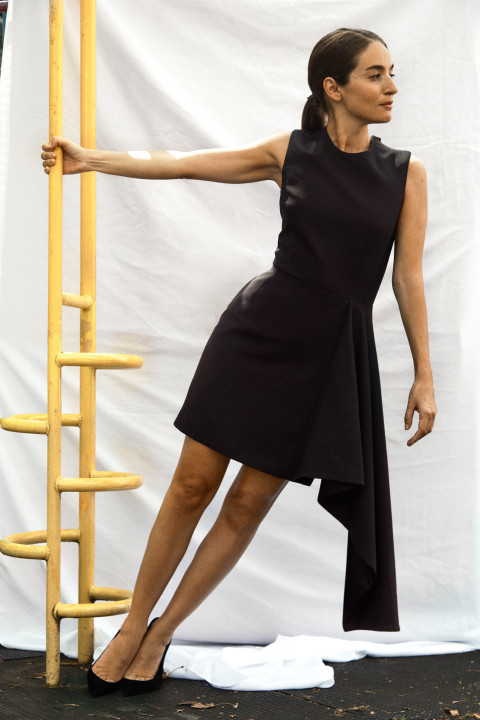Julie Zerbo Vs. Fake News
The Founder of The Fashion Law on Advertising Ethics and Why Fashion Is Becoming More Transparent

Julie Zerbo has made a habit of courting conflict. She is the founder of , a five-year-old blog dedicated to covering the fashion industry from a legal perspective. That often means holding brands accountable for their transgressions—from the human rights abuses perpetrated by fast fashion giants, to design theft in luxury maisons. Unsurprisingly, this often results in ruffled feathers. “Every time I write an article I’m really excited about,” Zerbo says, “it makes me more and more unemployable.”Zerbo started as a hobby while she was still in law school. “The website started because I wanted to supplement my straight-forward, black letter legal education with things that were going on in the fashion industry,” she explains. The blog’s reputation has grown as Zerbo has broken major stories. In 2012, she was profiled by after she published a story calling out Chanel for copying a bracelet designed by Pamela Love—the bracelet was never produced as a result. Now, Zerbo is a go-to source for industry journalists in need of legal expertise. She is routinely cited in , where she’s also become a contributor.There is something refreshingly old-school about . The site’s design is simple, almost Web 1.0 in its look, which points towards Zerbo’s essential interest: the text, the ideas, and the conversations they produce. The blog is an impressive example of the impact independent writing and analysis can still have. “It’s always interesting to see results,” Zerbo says. “You can get results from a blog you started in law school.”
When you say the work you’re doing at is making you unemployable, do you mean in the world of fashion? Or in law, too?I’m surprised brands don’t try to hire you. You know, like how banks hire hackers that reveal flaws in their security systems.
A lot of law firms are still stone age, even the ones that are fashion law firms. They think that with visibility or with an opinion, you make yourself unmarketable to clients. And while there’s probably some truth to that, I’d rather have an Instagram and write opinionated pieces.I think I’ve made it pretty clear that I don’t want a conglomerate’s investment. I’ve run the website in such a selfish way for all of these years because I don’t operate it based on what I think people want. If that’s what I was doing then it would all be pictures of me in Zara, writing about how everything Gucci is doing is fabulous. I put out what I think is interesting.

So what’s keeping your attention right now?Do you think it’s worse in fashion than in other industries?One of the beats that you’ve been really on top of is lax standards in disclosing sponsored content. Could you explain why this is such an important issue?I guess it really becomes an issue when it’s someone repping a weight loss tea or something.When it’s a handbag it’s dishonest, but it’s not gonna kill you.
For a long time it’s been the Federal Trade Commission and ethics in advertising. I’m really interested in the dissemination of less than accurate news and headlines. I’m obsessed with how fashion media views and values their readers. I just feel like there’s a total lack of respect.I don’t think fashion is different than any other industry. I do think, however, the argument that "this is just fashion" is completely absurd. Fashion is an industry that touches so many lives. Whether you’re interested in it or not, it’ll affect your life in some way.It’s a consumer rights issue, first and foremost. People should be able to go to a website and trust that what they’re reading is accurate. Consumers deserve to know when something is being sponsored. Viewing Instagram and social media as inherently or always sponsored, that’s probably the safe bet. But there are a lot of people who aren’t up on the FTC. Gen Z-ers, some of them just aren’t old enough to process what this could actually be. A lot of these advertisers’ practices are preying on uninformed people. I do this survey on twice a year about which influencers are and are not disclosing properly. Going into it, being like, “Is this an ad? Is this not an ad?”—I can’t tell every time. And if I can’t tell every time, how is anyone else supposed to?When it goes into pharmaceuticals or supplements, that’s a completely different ballgame.It’s not, but the principle is the same, and the law is the same. Whether it’s a bag or a weight loss supplement, it’s about whether the practice is deceptive to a small amount of people. I place a lot of emphasis on the role of influencers in this issue. There’s a misconception that these are just girls posting on their Instagrams. No, these are sophisticated business entities that stand to make millions, in some cases. Their reach is so expansive that it isn’t something to be taken lightly.

Do you think the bottom is going to fall out of influencer marketing at some point?I wonder what influencer marketing will turn into. Maybe it’ll just be a set of algorithms that analyze the shit you’re reading and the way you write and then serve up branded content to you in a voice that it knows you’ll like.I’m convinced that my phone’s microphone picks things up for advertising purposes. It makes me feel a little insane. Like, I’ll get ads for something that I’m certain I’ve never Googled, never typed into my phone, but I talked about in real life.Good question. Taking yourself out of that ecosystem is sort of removing yourself from popular culture. This is a depressing thing to say, but so much of life happens on these devices, and on platforms like Instagram.It’s a frighteningly unfiltered look at society’s id.
I think it’ll evolve into something else. The bottom fell out of traditional advertising. That took decades, but everything is sped up now.Sure, that’d be smart. Influencers are commodities, just like anything else in fashion.That’s what we signed up for. It’s the small print that we can’t dispute in court, because we’re using a service and in exchange we’re giving all of this information. But would you give up your iPhone to not be tracked?It’s a trade off. There is something really beautiful about social media. It does give us a platform. I never would have been able to start a website talking about the law without social media. But it’s also the bane of my existence. It reminds me of the nefarious practices of fashion and corporate America, and the scary views that people have.It gives you a view of people outside your circle, which is something we’ve not done a good job of not engaging with. That can be a good thing, but it can also be scary. I don’t expect or even want people to agree with everything I write, but I want them to think about it. When people only read headlines or 140 characters, it’s not a useful conversation.



I don’t think our brains are made to handle the level of connectivity we have now. started as a hobby and grew into something else. What’s something you’ve learned in that process that’s surprised you?Could you speak about one of those positive things you’ve noticed recently?What do you think Tisci’s legacy at Givenchy will be?
Media and journalism goes in waves. Now is a weird time, because there’s so much at our fingertips that we don’t know what’s up and what’s down. 140 characters or a headline allows us to feel like we know things. That’s scary.Writing for a broad audience is something that I wasn’t prepared to do. I didn’t go to school for journalism. When I was in college, I edited an economics journal. Everything I’ve ever done has been really niche in one way or another, and I think maybe that’s ’s strength. Also, learning how to make ’s message and values attractive. Not so abrasive. Trying to balance the more damning pieces with ones that shed light on the good things that come out of the fashion industry. Because there are good things—there are so many talents, so many people making waves in interesting ways.I wrote a positive piece this summer about Riccardo Tisci’s time at Givenchy, and specifically his couture work. That was my first introduction to truly modern couture. Obviously Raf Simons worked hard for a short amount of time at Dior to modernize couture, but, for me, Givenchy couture under Tisci was very innovative and boundary-pushing.I think his legacy will be tied to his introduction of accessible items. I mean, Givenchy didn’t have an it bag before him. You didn’t see Givenchy on the street before him. I hope his legacy isn’t just Rottweiler t-shirts, but they’re demonstrative of something bigger, and that’s houses not selling what’s on the runway. It’s these after-the-fact, more affordable items. I think Givenchy is a really good example of that. At the height of his time at Givenchy, I remember going to Kirna Zabête and there were maybe three styles of dresses, but you would see people wearing the t-shirts.


I guess that’s what’s interesting about Vetements and now Balenciaga—what people buy and wear is the same stuff that’s on the runway. Demna has made it really clear that he is interested in designing products that will actually be bought and worn.Is that a good thing?’s new tagline is “Democracy Dies in Darkness.”Are you interested in growing your own platform into something bigger?
Yeah. We’re not used to that kind of transparency in fashion.I really don’t think fashion will continue to be relevant or trustworthy or appealing if it continues to try to use all of its resources to shield consumers from all the shady stuff that is part of the business. I think we might be entering a time where readers and consumers respond to transparency. Fashion and fashion media is in no way removed from the larger scale of our daily existence. Right now, in the United States, it seems like we’ve kind of woken up to the inaccuracy of the news and are demanding more from publications. That’s why and , their ads are all about real news, accuracy, truth.That’s the underlying theme in all of these mainstream sources. So, I think that there is a desire for truth. It goes back to the respect thing. We got to this place in journalism because we slept on real journalism. We took the free press for granted because we wanted it shorter and faster.Yes, but only so the audience becomes bigger. That’s why I wrote a couple articles for , because I wanted a larger platform. I think this is information that people deserve to know. I want to share it.
SSENSE. Vogue, T: The New York Times Style Magazine, The Fader,
 In The Fold: Smashing Car Windows In Long Pleated Skirts Kaitlin Phillips On Beyoncé, Sacai, Grunge, The Olsens, Barnard, Issey Miyake, and Orphans The writer Elizabeth Hardwick—a Southerner in Manhattan—thought that the key to exploiting the greatness of winter was a plaid skirt with pleats. Diana Vreeland, likewise, imagined her readers wearing long, thickly pleated skirts, the cool of the cloisters lapping at chapped ankles. For the biddable sisters in , Catholic uniforms brought up seasonal memories too. “We knew the pain of winter wind rushing up your skirt.
In The Fold: Smashing Car Windows In Long Pleated Skirts Kaitlin Phillips On Beyoncé, Sacai, Grunge, The Olsens, Barnard, Issey Miyake, and Orphans The writer Elizabeth Hardwick—a Southerner in Manhattan—thought that the key to exploiting the greatness of winter was a plaid skirt with pleats. Diana Vreeland, likewise, imagined her readers wearing long, thickly pleated skirts, the cool of the cloisters lapping at chapped ankles. For the biddable sisters in , Catholic uniforms brought up seasonal memories too. “We knew the pain of winter wind rushing up your skirt.  Hybrid Footwear Charting a Moment in Crossbred Design Shoes are breeding! What does it mean? As genres, seasons, and fashion cycles lose their grip, hybrid shoes reflect our fragmented reality. They acknowledge a breakdown of norms; they represent the interpolation of historical settings and cultural moments. Desert boots, penny loafers, alligator pumps, espadrilles, shower slides, and moon boots are no longer mutually exclusive.
Hybrid Footwear Charting a Moment in Crossbred Design Shoes are breeding! What does it mean? As genres, seasons, and fashion cycles lose their grip, hybrid shoes reflect our fragmented reality. They acknowledge a breakdown of norms; they represent the interpolation of historical settings and cultural moments. Desert boots, penny loafers, alligator pumps, espadrilles, shower slides, and moon boots are no longer mutually exclusive.  Market Research: Thom Browne’s “Navy Center Back Stripe Blazer & Low-Rise Skinny” Rembert Browne’s Summer Of Suit feat. LeBron, America, And The Pope Like most roads that end with me, this story begins with Dwyane Wade. As reported in , the ex-Cavaliers guard sat with designer Thom Browne at the Manhattan restaurant Cipriani’s in October of 2017. There, it was Browne who propositioned Wade with an idea: outfitting the entire Cavaliers team in his suits for the 2018 playoffs. The idea made its way to his then-teammate and BFF forever LeBron James — himself, a veteran of wearing Thom Browne.
Market Research: Thom Browne’s “Navy Center Back Stripe Blazer & Low-Rise Skinny” Rembert Browne’s Summer Of Suit feat. LeBron, America, And The Pope Like most roads that end with me, this story begins with Dwyane Wade. As reported in , the ex-Cavaliers guard sat with designer Thom Browne at the Manhattan restaurant Cipriani’s in October of 2017. There, it was Browne who propositioned Wade with an idea: outfitting the entire Cavaliers team in his suits for the 2018 playoffs. The idea made its way to his then-teammate and BFF forever LeBron James — himself, a veteran of wearing Thom Browne. 